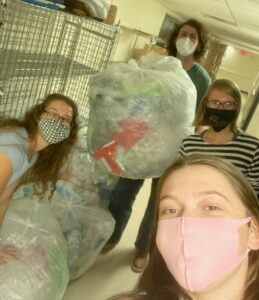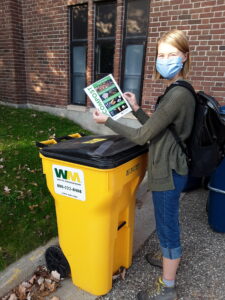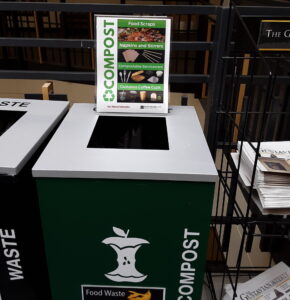Written by Kendra Held, photos taken by Audrey Ochtrup-DeKeyrel and Lily Engebretson
The beginning of this semester has been a great opportunity for growth as we assess how we can continue to advocate for sustainability on campus with our new, socially distant reality. There is no shortage of projects this year and the sustainability interns are hard at work!
Over the summer, the first Director of the Johnson Center, Jim Dontje, left this position in order to engage in service work in Rwanda and Burundi. Jeff Jeremiason and Chuck Niederriter are the new Co-Directors of the Johnson Center. Niederriter is leading initiatives to achieve the college’s energy reduction goal while Jeremiason is serving as chair of the PESC, working with Big Hill Farm and supervising the sustainability interns.
On September 26th, Sustainability Interns Lily Engebretson, Audrey Ochtrup-DeKeyrel, Aviva Meyerhoff, and Kendra Held gave a live presentation on “Environmental Activism and Sustainability at Gustavus” to current students and alumni during the college’s first virtual Homecoming celebration. Interns worked over the summer to plan this presentation and collaborated with numerous groups on campus such as ILS Houses, Building Bridges, Big Hill Farm, and the Arboretum. This presentation was a prime example of how our group is safely elevating student work in environmental justice and sustainability.
This year Collin Carlson will be evaluating Gustavus’ sustainability performance using the AASHE STARS program, a tool used to track, assess, and rate institutions on their sustainability practices and infrastructure. Additionally, Carlson will be partnering with the Co-Director of the Johnson Center, Charles Niederriter, to develop a plan to achieve the college’s renewable energy goal. This goal, announced by President Bergman in September 2019 after the Groundswell movement, aims to reduce energy consumption by 25% by 2024. Achieving this goal will require increased use of renewable energy sources such as solar, energy conservation habits adopted by students, and retrofitting of infrastructure to increase energy efficiency. Carlson is excited to share what he learns with the Gustavus community and improve energy literacy among students.
Meyerhoff is developing training materials to be used by the Admission Office and our tour guides. She strives to improve the overall visibility of sustainability work on campus by partnering with the Admission Office and the Sustainability Communications Team. She is also collaborating with an Environmental Studies Senior Seminar group focusing on LEED certification as the focus of their final project. Meyerhoff hopes to work with this group to start the conversation regarding the sustainability of future construction projects on campus and the importance of committing to a high level of sustainability from initial construction plans.
Engebretson is excited to work with another group of students in the E.S. senior seminar class. They are discussing avenues of using electric bikes on campus as a more environmentally friendly mode of transportation. The group is working towards a pilot project to increase the accessibility of these e-bike resources among students. She is also helping with waste stream education.
Ochtrup-DeKeyrel and Held are prepared to cultivate the connection between the Johnson Center for Environmental Innovation and Residential Life via an upcoming in-service with CF’s. They are both elated about the new Sustainability Representative position in Hall Council. These connections with students across campus will be crucial in their work to continue fostering a campus culture focused on accurate waste sorting and minimized energy consumption that begins in our res-halls! 
Additionally, Ochtrup-DeKeyrel is working with two E.S. Senior Seminar groups focused on composting and Big Hill Farm operations. She is eager to support these students in their projects this semester!
This year the sustainability interns are partnering with The Bookmark to continue the TREX plastic collection. This program allows institutions to collect clean, dry, stretchy plastic that can be converted into a durable bench once 500 pounds of acceptable material is collected. Amazon packages are a great item to put into the TREX plastic containers in the Campus Center, as well as empty plastic bags. Molly Yunkers in The Bookmark coordinates with TREX while the interns sort the plastic collected on a weekly basis. Over the summer, representatives from Physical Plant, Building Services, Dining Services, faculty, the Johnson Center, and the sustainability interns collaborated on a proposal for increased compost collection on campus. This fall, staff members have been dealing with infrastructural challenges that have limited composting efforts. In spite of these obstacles, staff members have remained dedicated to improving the composting process. Students can help staff by correctly sorting their waste into the proper bins. Incorrect sorting can contaminate an entire bin, so it is important to remember that “when in doubt, throw it out”. If you aren’t sure if an item is compostable or recyclable, it’s safer to choose to throw that item in the trash rather than risk the contamination of an entire recycling or compost bin. Have questions about what is and is not compostable? Email g-sustainability@gustavus.edu
Over the summer, representatives from Physical Plant, Building Services, Dining Services, faculty, the Johnson Center, and the sustainability interns collaborated on a proposal for increased compost collection on campus. This fall, staff members have been dealing with infrastructural challenges that have limited composting efforts. In spite of these obstacles, staff members have remained dedicated to improving the composting process. Students can help staff by correctly sorting their waste into the proper bins. Incorrect sorting can contaminate an entire bin, so it is important to remember that “when in doubt, throw it out”. If you aren’t sure if an item is compostable or recyclable, it’s safer to choose to throw that item in the trash rather than risk the contamination of an entire recycling or compost bin. Have questions about what is and is not compostable? Email g-sustainability@gustavus.edu
 New green compost bins and yellow compost kirbies have been distributed across campus. These receptacles are meant for compostable items only, not cardboard, recyclable plastics, or trash. If you are looking for another place to drop off your compostable items, such as carry-out clamshell boxes or compostable coffee cups, feel free to drop these items off at the Dining Hall carousel.
New green compost bins and yellow compost kirbies have been distributed across campus. These receptacles are meant for compostable items only, not cardboard, recyclable plastics, or trash. If you are looking for another place to drop off your compostable items, such as carry-out clamshell boxes or compostable coffee cups, feel free to drop these items off at the Dining Hall carousel.
The first few weeks of the semester have required Gustavus students, staff, faculty, and administration to adapt to new challenges with grace, patience, and flexibility. As opportunities for improvement arise, we will continue to rely on creativity, community resources, and clear communication to make positive progress towards a more sustainable campus.